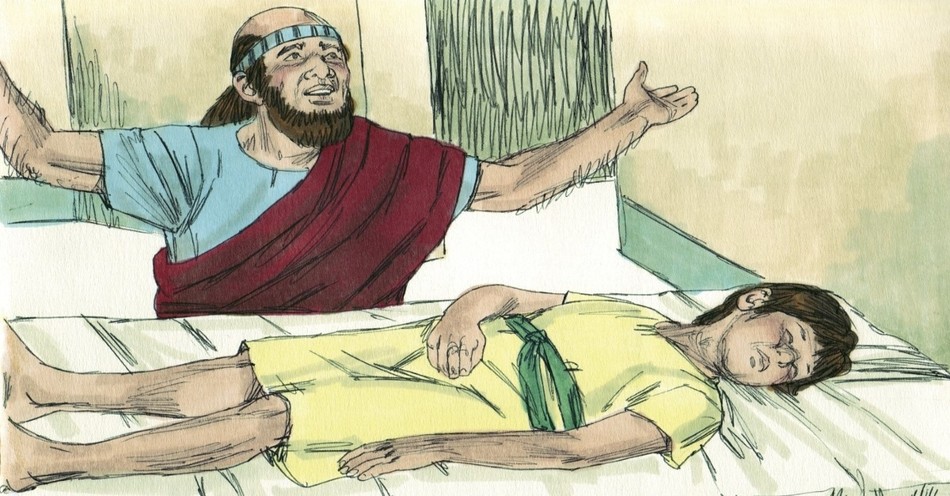What Do We Learn about Elisha in the Bible?
One of the most fascinating and eventful stories in biblical history is the life and service of Elisha in the Bible. As the prophetic successor of Elijah, Elisha—whose name means “My God is salvation”—had the privilege of his mentor’s wisdom, teaching, and ultimately a double-portion of Elijah’s spirit (2 Kings 2:9-10).
Through God’s Word—specifically 1 and 2 Kings—we discover how God called this mighty prophet to perform jaw-dropping miracles and deliver startling and unpopular messages to God’s rebellious people.
When we look at Elisha in the Bible, we see a man who walked in the confidence and power of the God he served. Let's look at his humble but dramatic beginnings as a prophetic messenger of the Most High God.
How Did Elisha Become a Prophet?
Elisha’s initial call to ministry reveals how God calls His children to service amid the mundane circumstances of everyday life. 1 Kings 19:19-21 details Elisha’s divine redirection:
“So Elijah went from there and found Elisha, son of Shaphat. He was plowing with twelve yoke of oxen, and he himself was driving the twelfth pair. Elijah went up to him and threw his cloak around him. Elisha then left his oxen and ran after Elijah. ‘Let me kiss my father and mother goodbye,’ he said, ‘and then I will come with you.’
‘Go back,’ Elijah replied. ‘What have I done to you?’
So Elisha left him and went back. He took his yoke of oxen and slaughtered them. He burned the plowing equipment to cook the meat and gave it to the people, and they ate. Then he set out to follow Elijah and became his servant.”
From Elijah’s God-ordained choice of Elisha, we learn that Elisha’s family most likely kept themselves from the rampant idol worship around them. They were landowners, and Elisha plowing with twelve yoke of oxen reveals he was a young man of significant stature and strength.
Verse 19 indicates that Elijah approached and placed his cloak around the shoulders of Elisha, foreshadowing the passing of prophetic leadership and ministry.
Elisha must have grasped some of the significance of the cloak because he immediately “left his oxen and ran after Elijah.” At the young man’s request to say goodbye to his parents, Elijah’s response of, “What have I done to you?” may sound harsh. But it translates, who’s stopping you?
Elisha’s life redirection may have been unexpected, but the prophet-to-be followed Elijah quickly and wholeheartedly—a great example for us today.
Later, in the opening chapters of 2 Kings, we see Elisha move from prophet-in-training to the official successor of Elijah.
In 2 Kings 2:9-10, as a last request to his teacher, Elisha asks for a double portion of Elijah’s spirit, to which the prophet replies, “You have asked a difficult thing,” Elijah said, “yet if you see me when I am taken from you, it will be yours—otherwise, it will not.” At this point, both mentor and student know their time together grows short.
“As they were walking along and talking together, suddenly, a chariot of fire and horses of fire appeared and separated the two of them, and Elijah went up to heaven in a whirlwind. Elisha saw this and cried out, ‘My father! My father! The chariots and horsemen of Israel!’ And Elisha saw him no more. Then he took hold of his garment and tore it in two” (2 Kings 2:11-12).
What a magnificent passing of the prophecy mantle of God! As the two walk along, sharing as teacher and student, they are suddenly separated by a chariot and horses of fire. In this stunning moment, Elisha witnesses his beloved mentor taken to heaven in a whirlwind. Imagine his myriad emotions—wonder, awe, fear, and incredible sorrow. “Then he took hold of his garment and tore it in two” (2 Kings 2:12).
For a deeper study of this powerful, God-ordained transfer of leadership, see 2 Kings 2:1-18.
What Miracles and Prophecies Did Elisha Perform?
Elisha’s service as God’s prophet is varied and fascinating. Consider the following from the amazing accounts in 2 Kings:
Elisha parts the Jordan River (2 Kings 2:14). He purifies the water for Jericho (2 Kings 2:18-22). He calls on two female bears for protection (2 Kings 2:23-25). He supplies water for the army of Israel and success over the Moabites (2 Kings 3:16-25). He provides the widow’s oil (2 Kings 4:1-7). He prophesies a son for a Shunammite woman who apparently can't have children (2 Kings 4:8-17). Elisha brings the son of the Shunammite woman back to life (2 Kings 4:18-37). He purifies poisoned soup (2 Kings 4:38-41). He feeds 100 men with 20 loaves, with leftovers (2 Kings 4:42-44). He arranges for the healing of pagan general Naaman (2 Kings 5:1-19). He curses his dishonest servant Gehazi with a skin disease (2 Kings 5:25-27). He makes an axe head float (2 Kings 6:1-7). He captures an army of Aramaeans by striking them blind (2 Kings 6:8-23). He prophesies relief from enemies and from famine (2 Kings 6:24-7:20). He prophesies the death of King Ben-Hadad of Aram and the rise of his successor Hazael (2 Kings 8:7-15). He prophesies Israel’s defeat of the Arameans (2 Kings 13:14-19).
Why Did Elisha Call Bears to Attack the “Boys” Who Taunted Him?
One of Elisha’s most interesting—and possibly confusing—stories is when he calls down a curse and two bears attack a group of youths mocking him. We hear this story in 2 Kings 2:23-25, where Elisha was walking to Bethel and “some boys came out of town and jeered at him” (2 Kings 2:23). Elisha called down a curse on the boys, and two bears appeared, mauling 42 of the boys (2 Kings 2:24). After this, Elisha kept walking until he reached Mount Carmel (2 Kings 2:25).
At first, we are horrified. Elisha cursed a group of children because they called him a name? Let’s take a closer look at the age of the attackers. As Bible.org explains, this passage uses the Hebrew naar for “boys,” a term the Bible uses for young men, including soldiers—and Isaiah is called a naar when he was 28. This wasn’t a group of children. It was a large gang of young men (over 42 of them) threatening Elisha. Maybe they were a band of local thieves. Maybe, as Bible.org suggests, they were sent by false prophets who didn’t want Elisha in Bethel. Either way, they were threatening him, and things were escalating into violence.
When God’s people are on a mission for Him, there is always a battle—spiritual warfare with the enemy of God (Ephesians 6:12). Elisha’s “curse” on his attackers was not vile language. Instead, the prophet was placing the attack (and response to the attack) in God’s hands, calling a curse on them in God’s name.
What Role Did Jezebel Play in Elisha’s Life?
When thinking about Queen Jezebel, we remember Elisha’s predecessor, Elijah, when he ran from the threats of this evil woman (1 Kings 19). But Jezebel also hated Elisha because of the prophet’s commitment to ending Baal worship. BibleStudyTools contributor Connor Salter details how Elisha anointed a commander named Jehua to lead Israel instead of Jezebel’s son Jehoram. After killing her son, Jehu commanded Jezebel’s servants to throw her out a window. When Jehu’s men came to collect her body and bury it, they found most of it eaten by dogs. Elijah had prophesied that dogs would eat Jezebel’s body (1 Kings 21:23), and Elisha started events that confirmed that prophecy.
What Were Elisha’s Final Prophecies?
Elisha’s final prophecies were given on his deathbed. Israel’s King Jehoash—in great distress—seeks the prophet’s wisdom one last time. The king had enjoyed the benefits of Elisha’s wisdom and prophecy, resulting in victories for Israel. The prophet’s death would be a great loss to the king and Israel.
Elisha’s final prophecy must have been a brief comfort to King Jehoash. Using a bow and arrows, Elisha showed Israel’s King that he would experience a limited victory over the Arameans (2 Kings 13:14-19).
Even after Elisha’s death, another miraculous event testifies to the power of this Spirit-filled man of God. In 2 Kings 13:20-21, we read about Israelites burying a man near Elisha’s tomb. When Moabite raiders appeared, they threw the body into Elisha’s tomb and ran away. The man came back to life when his body touched Elisha’s skeleton! Imagine the surprise of the Moabite raiders, not to mention the dead man!
Elisha lived a life of faithfulness and obedience to God’s call. We close with my favorite story from his life and ministry.
In 2 Kings 6, we see the King of Aram enraged over his failure to attack Israel successfully. When he learns of Elisha’s role in his failures, the king sends an army during the night to surround the city of Dothan and capture Elisha. We see this drama unfold in 2 Kings 6:15-17:
“When the servant of the man of God got up and went out early the next morning, an army with horses and chariots had surrounded the city. ‘Oh no, my lord! What shall we do?’ the servant asked. ‘Don’t be afraid,’ the prophet answered. ‘Those who are with us are more than those who are with them.’ And Elisha prayed, ‘Open his eyes, Lord, so that he may see.’ Then the Lord opened the servant’s eyes, and he looked and saw the hills full of horses and chariots of fire all around Elisha.”
Elisha’s servant saw the enemy, and fear overtook him. But Elisha knew that the God he served was more powerful than any army. This faithful man of God told his servant not to be afraid. “Those who are with us are more than those who are with them” (2 Kings 6:16). Elisha prayed, and the servant’s eyes were opened to the power of the living God all around them.
The life of Elisha in the Bible teaches us that in the difficulties of this life, we can be assured that our God remains faithful and true. He is stronger and mightier than any “army” we may face.

You’ll find Leigh Ann on an adventure with her sweetheart of 39 years, getting silly with her grands, or daydreaming story plots on the front porch.
Connect on LeighAThomas.com.
This article is part of our People of Christianity catalog that features the stories, meaning, and significance of well-known people from the Bible and history. Here are some of the most popular articles for knowing important figures in Christianity:
How Did the Apostle Paul Die?
Who are the Nicolaitans in Revelation?
Who Was Deborah in the Bible?
Who Was Moses in the Bible?
King Solomon's Story in the Bible
Who Was Lot's Wife in the Bible?
Who Was Jezebel in the Bible?
Who Was the Prodigal Son?


.jpg)
